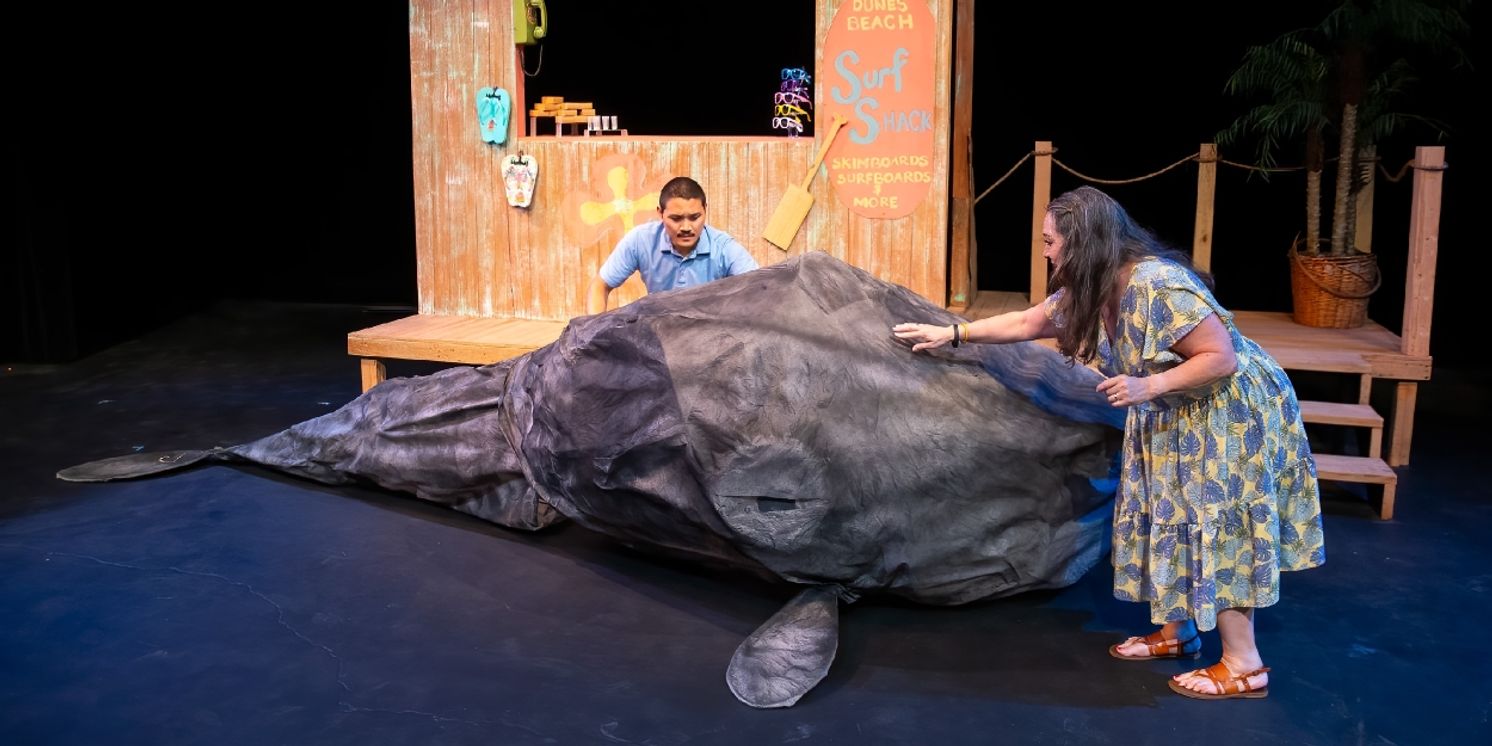Review: JENNA AND THE WHALE at Ground Floor Theatre
Like Jonah and the Whale, JENNA AND THE WHALE shows us the value of second chances and how to discover our own resilience

(Warning: This review contains spoilers and references to suicide)
Good Grief! In a sea (pun intended here) of shows addressing the subject of suicide, we get repeatedly exposed to theatrical productions showing us the darkness, problems, and inner worlds of individuals struggling with suicide — and sometimes these productions are quite poorly executed. Refreshingly, JENNA AND THE WHALE shows us how survivors navigate their own emotional terrain (even if it means being lost in said sea, so to speak). Here we have survivors who move toward integrating a healthy, and even hopeful, reality without their loved one. In Ground Floor Theatre’s current production of Vanessa Garcia and Jake Cline’s JENNA AND THE WHALE, we get an excellent metaphorical look at what good grief might actually be.
Even as we enter the lobby space of Ground Floor Theatre, Lowell Bartholomee’s superior sound design hits us right away. Making our way into the theatre itself, each of us is engulfed in… well… the belly of a whale at sea. Seats rumble like we’re right there on the ocean in a whale. Thanks to the standard black box feel (in other productions it can seem like a huge space to fill) JENNA AND THE WHALE feels perfect. We somehow feel like we’re in the belly of that whale, too. And Allison Kemmerer’s set design is uncomplicated. A wise choice for such a metaphorical theatrical experience.
You might recall, Jonah and the Whale is a biblical tale of a prophet, Jonah, who disobeys God's command to preach in Nineveh, attempts to escape, but is swallowed by a giant fish. After repenting in the fish's belly, he's miraculously regurgitated, preaches in Nineveh, and witnesses its repentance, highlighting divine mercy and second chances.
In our case though, we’re somewhere around Dunes Beach Florida, and Jenna (a credible Kelsey Mazak) has been swallowed by the same whale as Jonah (a charming and unassuming Matthew Vo). We learn Jenna’s been in a relationship with a young man named Patrick, who looks exactly like Jonah. Patrick was her boyfriend who committed suicide three years prior to Jenna being swallowed by a whale. Jenna’s mom Lynn (the ever magnetic Jennifer Jennings), has the difficult duty of explaining to her daughter that Jenna was not in the belly of a whale, but victim to a surfing accident that put her in a coma for several days. Jenna is also entangled in the web of Patrick’s family, his sister Coco (an authentic Keaton Patterson) and his mom, Rita (powerful Tonie Night).And Deputy Tyler (a funny and empathetic Brooke Ashely Eden) helps us weave the plot together.
Is the whale (Conner Hopkins’ well designed puppet) a metaphor for the suicidal individual, eventually on display, beached in the sand, everyone helpless to save it until it explodes? Perhaps it's a metaphor for all the overwhelming feelings we experience when we lose a loved one. Certainly it is a less confronting device for presenting the profoundly deep experience of death by suicide.
In each aspect of JENNA AND THE WHALE we are treated to the excellent production values of some of Austin’s finest talent. Schepps’ direction was so smooth I remained undistracted throughout the performance, my focus exactly where it should be at any given moment. And as I left the theatre, I realized there existed no trace of inauthenticity in this cast’s performances. And the value of working alongside the playwrights as Ground Floor mounted this premier production of JENNA is evident.
Rather than explore the meta narrative and the many metaphors of which the playwrights packed this script, I offer this: I’m a theatre reviewer who wears other hats. One of those has been as a hospital chaplain. From this perspective, JENNA AND THE WHALE is very much like the biblical story of Jonah and the Whale. It is indeed a story of second chances and divine mercy. JENNA AND THE WHALE seems, put simply, like the healthy evolution of emotions we are in sore need of making acceptable in our culture. These are feelings and emotions both Lynn and Rita, as strong maternal figures for Jenna and Coco, strive to embrace from their daughters. Rita especially, is a model of a healthy mother who is not so consumed by grief to have forgotten to be present for her living child. And Jenna and Coco have what playwrights Cline and Garcia call a “net of community” with which to experience their loss. There is healthy and unhealthy grief. JENNA AND THE WHALE gives us a look at grief that is, while metaphoric, refreshingly free of pathological tropes.
We need to embrace the varying displays of grief that lead us to resilience. This is especially so in a culture that is subject to offense by anything outside an established personal worldview. Those who are not in the middle of grief often give us sympathetic platitudes such as “I can’t imagine what you’re going through.” Perhaps not. But loss is universal. We can in our grief, walk beside each other in this net of community. There are companions to be found in grief and loss. And like the biblical story of Jonah and the Whale, JENNA AND THE WHALE shows us the value of second chances and how to discover our own resilience.
JENNA AND THE WHALE
By Vanessa Garcia, Jake Cline
Directed by Lisa Schepps
Ground Floor Theatre
979 Springdale Rd
Austin, TX, 78702
August 10 - 26, 2023
Photography credit: Steve Rogers Photography
Reader Reviews

Videos

